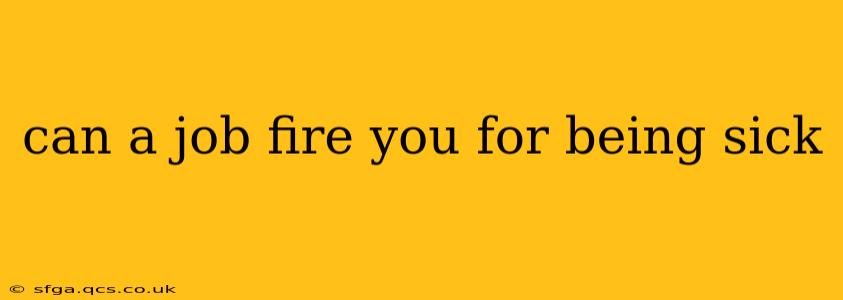Getting sick is an unavoidable part of life. However, the question of whether an employer can fire you for being sick is complex and depends heavily on various factors. While outright dismissal for illness alone is generally illegal in many countries, the specifics are nuanced and require careful consideration. This article will explore this crucial issue, answering frequently asked questions and offering guidance on protecting your rights.
Can I Be Fired for Taking Sick Leave?
The legality of firing an employee for being sick depends significantly on the location, the type of employment (full-time, part-time, contract), and the specific circumstances. In many countries, laws protect employees from discrimination based on illness or disability. These laws often mandate that employers provide a reasonable amount of sick leave, and firing an employee solely for using that leave would be a violation. However, there are exceptions.
The key is whether the absences are legitimate and reasonable. If an employee frequently calls in sick, especially if there's a pattern of suspicious absences or a lack of supporting documentation, the employer might have grounds to take action. This is not necessarily about being sick, but rather about the impact on the workplace and the employer's ability to maintain operational efficiency.
What if I Have a Serious Illness?
Employees with serious, long-term illnesses are often covered by additional legal protections, depending on their location and the nature of the illness. Laws related to disability discrimination often apply, requiring employers to make reasonable accommodations to allow the employee to continue working. This might involve modified work schedules, adjusted duties, or other supportive measures. Firing an employee with a serious, documented illness without considering reasonable accommodations could lead to legal repercussions.
What Constitutes Excessive Absenteeism?
Defining "excessive absenteeism" is context-dependent. An employer might consider several factors, including:
- Frequency: How often is the employee absent?
- Duration: How long are the absences?
- Pattern: Is there a pattern to the absences (e.g., always Mondays or Fridays)?
- Documentation: Does the employee provide medical documentation to support their absences?
- Impact on the workplace: Does the employee's absence significantly disrupt workflow or productivity?
There's no magic number of sick days that automatically constitutes excessive absenteeism. Employers usually have policies outlining acceptable levels of absence, but these policies must be applied consistently and fairly across all employees.
What if My Employer Doesn't Follow the Rules?
If you believe your employer has unfairly fired you for being sick or for taking legitimate sick leave, you should seek legal advice immediately. Employment laws are complex, and a lawyer specializing in employment law can help you understand your rights and options. Depending on your location, you might be able to file a complaint with a relevant government agency or pursue legal action.
What Documentation Should I Keep?
Always maintain records related to your health and employment. This includes:
- Medical documentation: Doctor's notes, hospital records, etc.
- Sick leave requests: Keep copies of any requests you submit to your employer.
- Employer communications: Save emails, letters, and other correspondence related to your absences.
This documentation is crucial if you need to prove your absences were legitimate and that your employer acted unfairly.
Do I need a Doctor's Note for Sick Leave?
This varies significantly depending on company policy and location. Some employers require doctor's notes for absences exceeding a certain duration, while others operate on a trust-based system. Always check your employer's policies and be prepared to provide documentation if required.
In conclusion, while an employer can't typically fire you simply for being sick, repeated or unexplained absences can create problems. Understanding your rights, maintaining proper documentation, and seeking legal counsel if necessary are crucial steps in protecting yourself. This information is for general guidance only and is not a substitute for legal advice. Always consult with an employment law professional for specific advice related to your situation.
